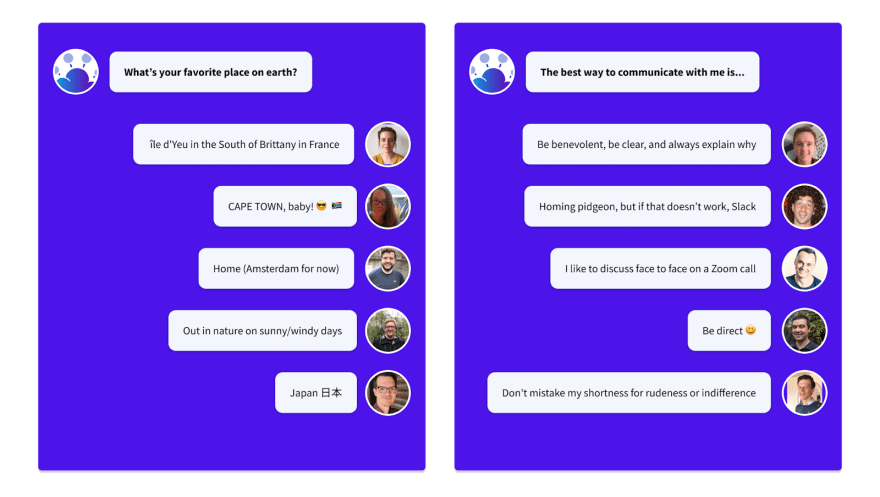Tips for Running an Effective Virtual Offsite
This post originally appeared as Tips for Running an Effective Virtual Offsite on The Bearer Blog.
Offsites are a big part of remote teams. They allow everyone to socialize, connect more deeply with coworkers, and help build shared experiences and empathy. Even if video calls are a great tool to share information, they can be tiring. It's too easy to miss non-verbal cues. Chance encounters over coffee never happen, and we dont always experience the same personal connections that come from small-talk. Thats the downside of remote work, and that's why meeting a few times a year is a great way to fill the gap!
Planning an offsite can be challenging, but it also provides the opportunity for your team to explore an exciting place. With many teams looking for ways to mimic the traditional offsite in a limited-travel world, here are a few tips we learned after holding our first virtual offsite.
Context
The Bearer team is remote-first. Other than a few Bears that live in the same region, most of us only see one another digitally. This is why we put an emphasis on consistent offsite events. Shortly before COVID-19, we held one in France. Before that, the team met up in Portugal. The number of offsite photos used as Zoom backgrounds tells me that the team really enjoys them!
Because of the COVID-19 crisis, we couldnt organize the offsite we were planning for Q2. Travel was more difficult, but beyond that, we wouldnt have taken the risk of putting our coworkers health in jeopardy. Our first thought was to cancel it, but we decided to experiment with a full-virtual offsite. A remote, remote offsite that we dubbed Together Week.
Start with a mix of work and play
We came up with a lot of ideas to make this week enjoyable and took inspiration from Hotjars article on virtual team building. We also had a nice chat with Bele Schtt from Candis who organized a remote offsite day a few weeks before ours.
The first question that came to mind was: if we miss the human interaction component, what should we focus on? This would be a time to take a step back from our daily work, mix up the normal team dynamics, and work on something different. The offsite should allow everyone to take time to experiment, far from the usual roadmap.
Set a theme, a task, and a goal
We put together teams made up of members from each department and set them a task to complete by the end of the week. Our project theme became: How can we attract more top-notch developers to test and adopt Bearer. Aside from the hard-limit on planning and presenting, no constraints or restrictions were set on what or how a team could approach the theme.
Our teams shared the work, discussed, debated, and built solutions throughout the week. All the teams did a great job. We arent just saying that. On Friday, each team had the opportunity to present what they spent the week building. Not only were the presentations amazing, but all the ideas have found their way onto future roadmaps at Bearer. It was great to see how impressed everyone was by each other's work!
While we initially planned to offer a prize to the winning team, the quality of work made it impossible to choose.
Instead of selecting a single winner, we decided that everybody won. Everyone at Bearer will receive a beautiful pair of hand-made slippers as a souvenir. The perfect treat for working from home!
Incorporate social activities and outside voices
Make the week special. On top of a hackathon or special-projects sprint, incorporate time for both structured and unstructured socializing. Find ways for to increase team bonding without making it feel like a chore. Here are a few things that worked well for us.
Guest Speakers
To bring in some fresh ideas, we invited external speakers to share their experiences. A huge thank you to Sylvain Kalache from Holberton School, Maxime Locqueville fromAlgolia, Rodolphe Dutel from Remotive, and Josh Dzielak from Orbit. Each came, virtually, to speak with the team. We learned about great remote routines, tips for working in multicultural teams, and advice on building a nice developer experience and community.
Make sure to record each session for those that cannot attend live. Spreading these throughout the week is a great way to inspire and keep the team motivated!
Team meals and coffee breaks
To help with the missing social aspect of offsites, ask everyone to take virtual coffee breaks during the week. More specifically, we encouraged our team to meet with someone they don't work with often. Some team members made small talk and used the time to catch up. Others got into discussions about quarantine life, and some used the questionnaire answers and guest speaker talks as conversation starters.
The team also scheduled a few happy hour style events across different time zones. We tried to align them so those starting the day could share coffee and breakfast, while those ending the day could share drinks and dinner.
Virtual Escape Game
Early on, we decided against many of the game style team building activities for fear that they would be stressful for some, and difficult with Zoom. One that we did try was a virtual escape game. The team split into groups of roughly 6-8 people, and an outside facilitator set every person a task. We all had information to share and the goal was to crack our individual codes, then combine our information to save the world! For some of us, the puzzle was quite challenging, and the discussions carried over into the after-work happy hour!
Make it work from anywhere
Make sure everyone can take part, no matter their location and time zone. This should be obvious for a remote team, but offsites are so often thought of as a way to break the rules, that it can be easy to forget. With team members in Bangkok, South Africa, the United States, and spread across Europe, the challenge for our team was high! This meant enforcing asynchronous communication and documenting everything.
Set up shared workspaces if you havent already. We use Notion, Miro, and Slack heavily within the teams. Each team set up dedicated channels and documents for the weeks tasks. We also put together a company-wide channel in slack dedicated to the offsite. This keeps the normal work channels clear, but also acts as a nice archive of the events.
Be as asynchronous as possible, within reason. Sometimes it really helps to get together. We let each team manage their own meeting times. Teams were assembled so there was at least an hour or two of overlap to allow for daily check-ins as needed.
Record any live chats and alternate the scheduling. Earlier we talked about inviting speakers. When scheduling these, try to mix up the times to allow everyone to attend some of them live. For those that cannot make them all, record the sessions for later viewing.
Make support available throughout the process
For our hackathon-style task, we paired up teams to provide feedback and support. Team A was in charge of feedback for Team B, Team B for Team C, and so on. This gave teams fresh eyes and a sounding board for their ideas. An approach such as this encourages teams to interact more and keeps the feedback loops efficient.
We also had a handful of people within the company working outside of the hackathon structure. In particular, our founders Guillaume and Cedric. They made themselves available to the teams throughout the week, and offered support and ideas from a higher-view perspective. Some teams took advantage of their insight more than others, but all found the direct input throughout the process useful. Designate managers or others to ensure you have coverage and can support the teams in any way they need.
Use this time to improve team resources
Improving team dynamics and social experiences within remote teams is one of the largest benefits of a traditional offsite. That doesnt mean the same ideas cant help inform your day-to-day processes. For example, we decided to create a page in Notion where people can share more about themselves. To make it easier, we used a mix of Proust questionnaires, user manuals, and work-related questions. The team has been very creative in the format. As the last hire in the team, I enjoyed reading each of the descriptions and found some common talking points to discuss with the team soon. Im sure the new hires will enjoy it as much I have!
Create a shared experience
One way to further make everyone feel connected around the event is to send out a care package. This can be a kind of onboarding box that arrives before the week begins. In this box, each person will receive what they need for the week. Things like: a notebook, an interesting book to read, some snacks, and maybe even some instructions for a treasure hunt.
While time constraints and logistics prevented us from doing it this time, we feel like its a great way to reward the team, and set a tone for the week. Not to mention it is a great excuse to print some new company-branded gear! You dont even want to know the number of Bear-related puns we came up with during the offsite. Some were _unbearably_bad.
Look for ways to improve future offsites
No amount of planning will make for the perfect event, so make sure to solicit feedback from your team. What worked for them? What did they enjoy the most? What would they change? Overall, we received very positive feedback from the team, which was our main goal. We wanted people to have a good time and to work differently.
We also received some valuable constructive feedback. One item that stood out was making sure the games were accessible to non-native English speakers. Solving anagrams is hard enough when they are in your native language!
Core things to keep in mind
We learned a great deal from our first virtual offsite. While it cant completely replace the enjoyment of all getting together in an exciting location a few times a year, it gets about as close as you can.
If youre planning to organize a virtual offsite week, here are some tips to get you started:
- Break into small groups to make sure the work part is enjoyable.
- Virtual escape games are a really great option!
- Invite people from the outside to learn from them: its the perfect time to open your minds!
- See if there are any social, internal tasks you want to address that you never take the time to do, or those you want to experiment with. Have everyone fill out a bio, set up video game groups, launch a coffee break app, and improve your remote onboarding!
- Make sure youre clear on the expected outcomes: as soon as we agreed on the fact that it was okay not to have immediate results from the work of the teams, the fun and experiments really started.
With our first virtual offsite now completed, we are already thinking about the next Together Week and are dreaming of having the possibility to do it in real life! Stay tuned for photos of happy bears in cozy slippers.
By Marion Aguirre, Head of Talent @ Bearer
Original Link: https://dev.to/bearer/tips-for-running-an-effective-virtual-offsite-480g
Dev To
 An online community for sharing and discovering great ideas, having debates, and making friends
An online community for sharing and discovering great ideas, having debates, and making friendsMore About this Source Visit Dev To





